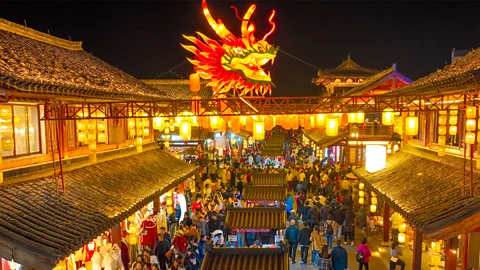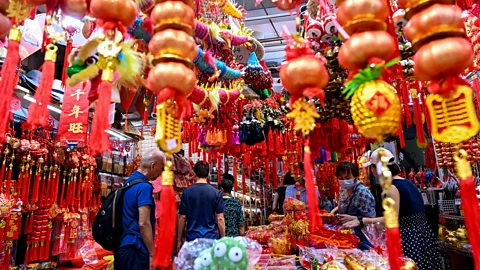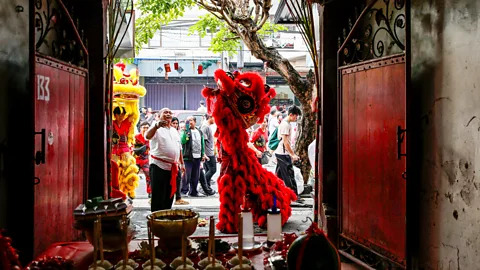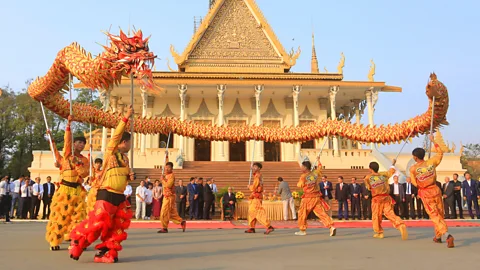See how cultures around the world are kicking off the Year of the Dragon
 Getty Images
Getty ImagesLunar New Year revelry kicked off this week, with celebrations far beyond China.
The Lunar New Year goes by many names. Most commonly, it is called the Chinese New Year or Spring Festival. This year, people around the world rang in the Year of the Dragon on 10 February 2024. "It is one of the most important and celebrated holidays in several Asian countries. The festival is rich with cultural significance, symbolising the beginning of a new year filled with luck, prosperity, and happiness," said Jenny Leung, executive director of the Chinese Culture Center of San Francisco.
While Lunar New Year is traditionally observed in East Asian countries, it is also celebrated by people of Asian descent around the world. When asked roughly how many people celebrated in Calgary, Canada, this year, Tony Wong, president of the Calgary Chinese Cultural Centre, estimated 200,000. "For many years, people have been saying that we have 100,000 Chinese [people] in Calgary, but I believe that is low. We have probably 150,000 or closer to 200,000 Chinese [people] in Calgary."
And he estimates that number, in turn, is still low if you're looking to count how many individuals are kicking off the Year of the Dragon this week. He notes that Calgary is also home to many people who came from the Philippines, Vietnam, Singapore, Malaysia, Korea and Thailand. "They all celebrate Lunar New Year," Wong said.
Although the occasion is typically met with public parades and private meals with families, there are many different ways of celebrating that are tailored to the location and cultures represented there. In some places, Lunar New Year is a public holiday. In others, it is principally observed as a religious holiday. Here's how places around the world are kicking off the Year of the Dragon this week.
 Getty Images
Getty ImagesAustralia
In cities such as Sydney and Melbourne, public spaces transformed this week with dragon boat races, vibrant street markets and cultural performances that catered to thousands. Among the most popular was Sydney’s Lunar Festival, which illuminated the city with lanterns, art installations and Asian food stalls.
These events not only acknowledge the Asian Australian contribution to the country’s culture but also encourage people of all backgrounds to spend more time in Asia-centred spaces such as Melbourne’s Chinatown and unofficial Koreatown.
The United Kingdom
The holiday was highly anticipated throughout the UK. In Belfast, the celebrations took place on 4 February. Liverpool celebrated with free events from 9-11 February. London’s Chinatown, Trafalgar Square and the National Maritime Museum were abuzz with workshops, performances and family-friendly activities on 10 February. If you’re still craving an on-site celebration, the Chinese Cultural and Welfare Society Scotland will hold the annual Glasgow Chinese New Year celebration on 18 February in George Square. There’s even a free but ticketed art show that is open to the public.
United States
The Year of the Dragon is also being celebrated throughout the United States. In June 2023, Colorado designated Lunar New Year Day, 10 February, as an observed, but not official, state holiday. This was after a similar 2022 move by then-Governor Gavin Newsom, who wrote to the California State Assembly, "Recognizing this day as a state holiday acknowledges the diversity and cultural significance Asian Americans bring to California and provides an opportunity for all Californians to participate in the significance of the Lunar New Year."
Leung notes that San Francisco’s Chinatown is the oldest Chinatown in America. There, the Lunar New Year is led by the Chinese Chamber of Commerce and celebrated with three weeks of activities, including the world-famous Chinese New Year Parade, which has been running since 1851.
"This year, [the Chinese Culture Center (CCC) of San Francisco] has exhibitions and an artist residency – Master Chi Chi – showcasing the work of Hong Kong artists with disabilities with artist activities for the Lunar New Year," Leung shared. "CCC is also exhibiting Perilous Playground, a multidisciplinary exhibition guest curated by C & G Artpartment, formerly of Hong Kong."
Throughout the rest of the US and across North America, private observances of the Lunar New Year involve cherished family gatherings and time-honoured rituals, such as gifting red envelopes and eating fish. Wong says that the family dinner is the most important part. Dishes are always a play on words, meant to attract positive outcomes – the word for fish in Cantonese, for example, sounds like the word for surplus, he explained. Black hairy fungus, another typical dish, "means prosperity or getting rich suddenly", he added.
Chris Kwok, the American-born Chinese owner of Hey Hey Drinks in Los Angeles, adds that "unfortunately, as generations stay in America, a lot of the traditions might get lost or not practised because of the language. And 2nd or 3rd-gen Americans will forget". To keep the tradition alive, he is marking the occasion at his contemporary tea house by rolling out a specialty dragon-inspired drink made with orange soda and pomelo juice –the colours of the dragon. "The overall [gist] is to launch the new year with the most blessings possible."
 Getty Images
Getty ImagesIndonesia
Indonesia regards the Lunar New Year or Spring Festival as a public holiday, which has become a unifying festival between different people with diverse cultures. After all, "Bhinneka Tunggal Ika", meaning "Unity in Diversity", is also the national motto.
Here, the New Year’s meal is particularly special because it brings families together. In addition to its home-cooked food, Indonesia is known for lavish restaurants and buffets. If you’re in Jakarta or Bali this year, check out restaurants that are channelling the dragon spirit in Epicurean style. For example, from 9-29 February, the Pasola restaurant at the Ritz-Carlton in Jakarta is offering a Chinese gastronomy experience designed by executive Chinese chef Aik Choon Ng.
Cambodia
Called Chaul Chnam Thmey, Moha Sangkranta or Sangkranta, the Lunar New Year in Cambodia is not a public holiday, but it is widely celebrated in cities such as Phnom Penh, where festivities include impressive temple decoration, colourful lion dances to ward off evil spirits and soaring fireworks. Cambodian celebrations typically last three days. Mixing the spiritual with the social, Cambodians make the most of each day by partaking in special dances and games meant to usher in prosperity and joy in the new year.
 Alamy
AlamyBhutan
With a population of less than a million people, Bhutan was an absolute monarchy until just before the turn of the century. It is known around the world for prioritising "Gross National Happiness" over gross domestic product. But Bhutan has a unique way of celebrating the Lunar New Year, known as "Losar", which is celebrated as an austere religious festival based on the Buddhist tradition. Traditionally, the same name is also used by people from Tibet, Nepal and certain parts of India.
The Bhutanese consider Losar an ideal time for soul purification, and monastaries and temples fill with the devout. Lunar New Year is just one of many holidays used to mark milestones on the lunar calendar. In Bhutan, the Paro Tschechu and Thimpu Tschechu festivals are just as important as Losar, if not more.
---
Join more than three million BBC Travel fans by liking us on Facebook, or follow us on Twitter and Instagram.
If you liked this story, sign up for the weekly bbc.com features newsletter called "The Essential List". A handpicked selection of stories from BBC Future, Culture, Worklife and Travel, delivered to your inbox every Friday.
